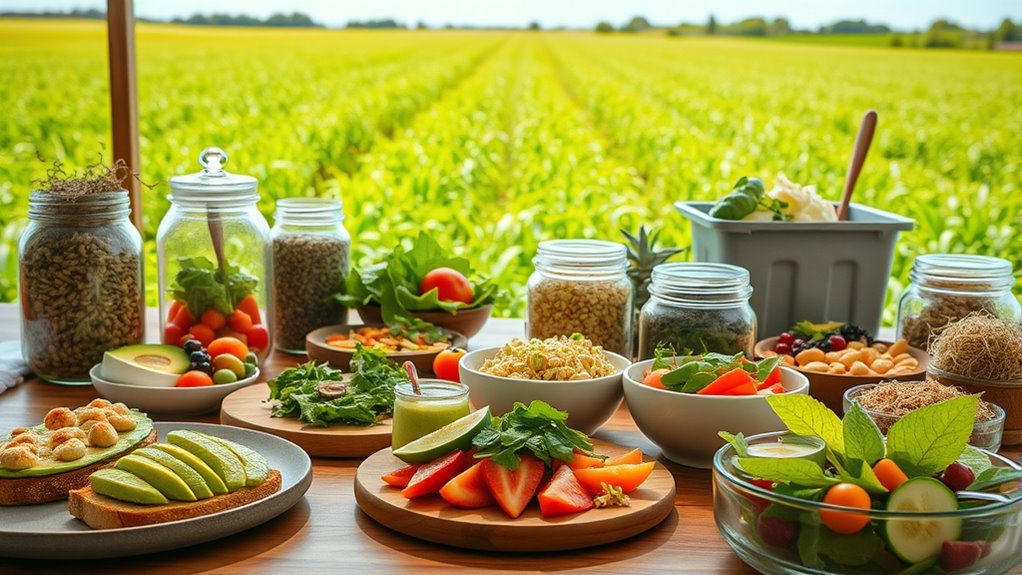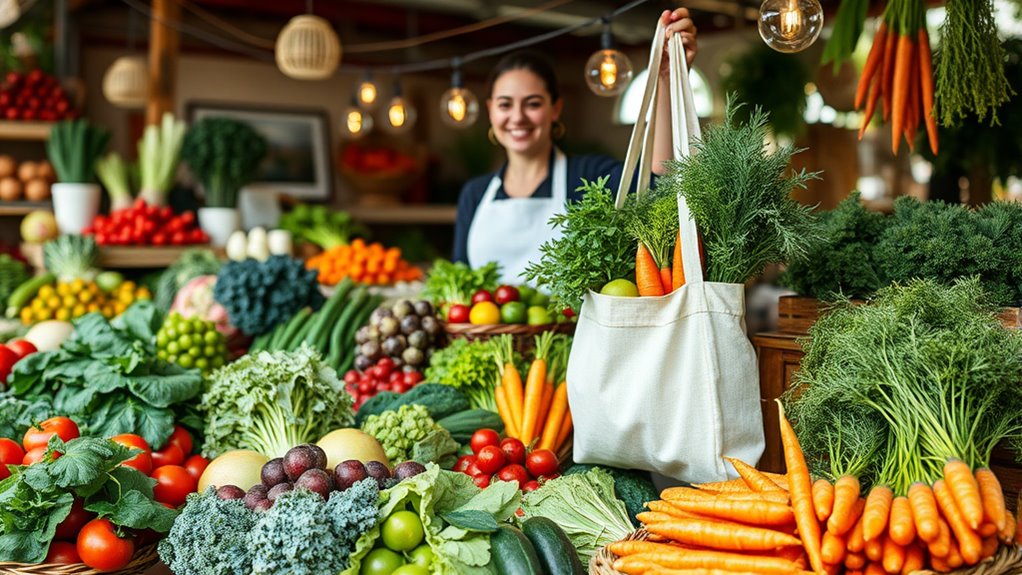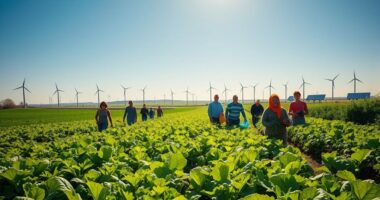Adopting a vegan diet helps support the circular economy by reducing resource consumption, waste, and the need for packaging. Plant-based foods typically generate less waste and often use eco-friendly, recyclable, or biodegradable packaging, minimizing environmental impact. Your dietary choices encourage sustainable practices across supply chains and promote resource efficiency. By making these changes, you’re contributing to a resilient food system that keeps materials in use longer. If you’re curious how these habits further enhance sustainability, there’s more to explore.
Key Takeaways
- Vegan diets require fewer resources, lowering environmental impact and contributing to sustainable resource use within the circular economy.
- Plant-based foods often use recyclable or biodegradable packaging, supporting waste reduction and resource efficiency.
- Adopting veganism encourages brands to adopt eco-friendly packaging, closing the loop in material reuse and recycling.
- Vegan diets help minimize food waste through conscious consumption, meal planning, and composting, aligning with circular waste management principles.
- Overall, veganism promotes a resilient, resource-efficient food system that reduces waste and supports sustainability goals.

Veganism and the circular economy are increasingly linked as sustainable solutions for reducing environmental impact. When you choose a vegan diet, you’re not only making a personal health decision but also contributing to a more resource-efficient system that minimizes waste. This connection becomes even clearer when you consider how food production influences packaging practices and resource use. Sustainable packaging plays a crucial role here, as it helps reduce plastic waste and lowers the environmental footprint of your food choices. By opting for products with minimal or biodegradable packaging, you support a system that values resource efficiency—using fewer materials and generating less waste. This approach aligns seamlessly with the principles of the circular economy, which aims to keep resources in use longer and prevent unnecessary disposal.
Your dietary choices directly influence the demand for packaging materials. Plant-based foods often come with packaging designed to be sustainable, such as recyclable or compostable wraps, which further reduces waste. When you prioritize buying from brands committed to sustainable packaging, you actively promote the reuse and recycling of materials, closing the loop on waste and helping conserve natural resources. furthermore, your focus on resource efficiency extends beyond packaging. Vegan diets typically require fewer land, water, and energy inputs compared to animal-based foods. This means you’re helping optimize the use of finite resources, reducing the strain on ecosystems and lowering greenhouse gas emissions associated with food production. As a consumer, your demand for plant-based and eco-friendly products encourages suppliers to innovate and adopt more sustainable practices, reinforcing the circular economy model.
Additionally, making conscious choices about food waste reduction supports the circular system by minimizing unnecessary disposal and encouraging resource recovery. In addition, your awareness of resource efficiency encourages you to minimize food waste. Planning meals carefully, storing leftovers properly, and composting organic waste are simple actions that keep resources in circulation longer. Composting, in particular, exemplifies circular principles by returning nutrients to the soil instead of sending waste to landfills. This cycle reduces the need for synthetic fertilizers and prevents methane emissions from decomposing organic matter. Your conscious efforts to reduce waste and choose sustainable packaging contribute to a more resilient, circular food system—one where materials are reused, recycled, and kept in use for as long as possible.
Frequently Asked Questions
How Does Veganism Impact Water Conservation Efforts?
You can make a big difference in water conservation by choosing a vegan diet. Veganism leads to significant water savings because plant-based foods typically require less water to produce than animal products. By reducing your consumption of meat and dairy, you support resource conservation and help lower the demand for water-intensive farming. Your dietary choices directly contribute to conserving water and promoting a more sustainable, circular economy.
Can Vegan Products Be Sustainably Sourced Globally?
Think of sourcing vegan products like weaving a vibrant tapestry; it’s possible but requires careful planning. Yes, vegan products can be sustainably sourced globally if you prioritize supply chain transparency and embrace local sourcing strategies. These practices help guarantee ethical standards and reduce environmental impact. By supporting farms and manufacturers with transparent supply chains, you help create a sustainable, interconnected system that benefits everyone and minimizes waste.
What Are the Challenges of Implementing Circular Economy Practices in Vegan Food Production?
You face challenges implementing circular economy practices in vegan food production due to supply chain complexities and limited recycling infrastructure. Managing sustainable sourcing across global networks can be complicated, leading to increased waste or inefficiencies. Additionally, inadequate recycling facilities hinder the reuse of packaging and by-products, making it harder to close the loop. Overcoming these issues requires investing in better infrastructure and streamlining supply chains for a more sustainable vegan food system.
How Does Veganism Influence Biodiversity and Ecosystem Health?
Imagine switching to a plant-based diet, and you help protect biodiversity preservation by reducing habitat destruction from intensive livestock farming. Veganism promotes ecosystem resilience by lowering greenhouse gas emissions and decreasing pollution runoff. For example, a community adopting vegan practices can restore local habitats, supporting diverse species. Your choices directly contribute to healthier ecosystems, ensuring resilient environments that sustain life and maintain biodiversity for future generations.
Are There Any Economic Incentives for Businesses Adopting Vegan and Circular Practices?
Yes, there are economic incentives for businesses adopting vegan and circular practices. You can benefit from plant-based subsidies, which reduce costs and encourage sustainable sourcing. Switching to eco-friendly packaging appeals to eco-conscious consumers, boosting your brand image and sales. These practices also help you minimize waste, lower disposal costs, and comply with regulations, ultimately increasing profitability while supporting environmental goals.
Conclusion
So, by choosing a vegan diet, you’re not just helping animals or the planet—you’re also giving waste a run for its money. Ironically, the more you embrace plant-based living, the less waste you create, turning your plate into a symbol of sustainability. Who knew that simply changing what’s on your plate could rewrite the story of waste? In the end, your diet might just become the most delicious act of environmental rebellion.










